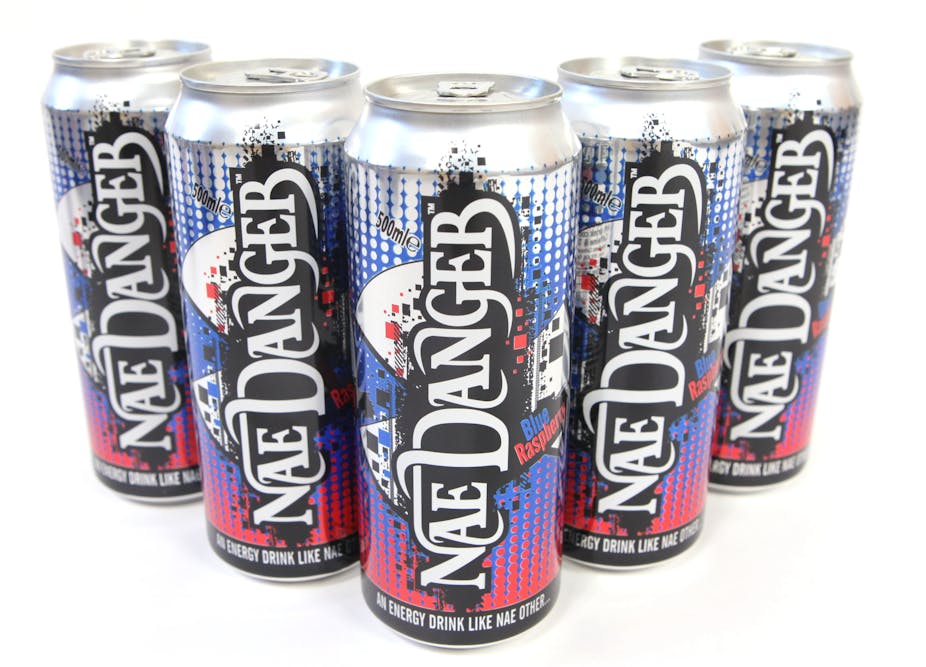Nae Danger, the Scottish energy drink, had its television advertising campaign banned the other day by broadcaster STV. The ads, which ended with the strapline “chokin’ for boaby”, were ostensibly about a BMX biker called Boaby.
But “boaby” is also Scottish slang for the male member, so STV decided to give them the, er, pull. (Note that thanks to the hashtag message #CHOKINFORBOABY at the end of the advert, they probably haven’t been removed from the public altogether.)
The ban came despite the fact that the ad was approved by Clearcast, the company that vets adverts. It also received no complaints from the viewing public. The question arises, are these adverts merely doing what they should, which is to be memorable and connect with the target audience? Or are they crossing a line in terms of what is suitable for product promotion and consequently audience amusement?
A drinks firm using Scottish phrases as an underlying theme in its advertising is not without precedent as can be observed from the campaigns of Irn-Bru. In particular the “Irn-Bru gets you through” series of adverts combined phrases associated to Scottish culture with Irn-Bru’s unique take on everyday situations.
The approach of Irn-Bru was also not without controversy with customer complaints relating to an advert broadcast in 2000 and then again in 2003 on the grounds of being offensive to transgender people; and adverts which have been accused of sexual innuendo or in the case of the “Cheer up Goth” advert in 2003 for encouraging bullying.
The formulae for successful adverts are well documented. They include: has to be memorable; is easily recognised and recalled; connects with the target audience; with a clear call to action. How companies go about successfully addressing these criteria has been debated over the years, with much discussion about the most controversial ad campaigns of all time.
Similar if not quite the same is shock advertising. The classic example is arguably Benetton, who deliberately set out to cause trouble with images such as a bird covered in oil, and a priest and nun leaning in to kiss. The creative work was usually about going against social values and raising awareness about environmental and human rights. Benetton aside, here comes my top five controversial UK ad campaigns of all time.
KFC’s bad manners
The KFC advert in 2005 featured call centre employees singing with their mouths full. The advert was criticised for encouraging children to imitate the behaviour and the wider issue of encouraging bad manners among children.
The animal rights Paddy
The Paddy Power advert of 2010 featured a cat wearing a bell on its collar being accidentally kicked by blindfolded players on a football pitch. The advert was criticised for potentially encouraging cruelty to animals and being offensive to the disabled.
Go Compare gets violent
The Go Compare adverts of 2012 featured a variety of scenarios involving celebrities striking an opera singer with, among other items, a football and bazooka. The advert was criticised for being offensive and trivialising terrorism.
Marmite not awlright!
The Marmite advert of 2013 featured jars of marmite being saved from neglect in a variety of households. The advert was criticised for trivialising the issue of animal neglect and the work of authorities such as the RSPCA.
You know when…
The Tango soft drink adverts of the 1990s involved an orange genie in a variety of scenarios with the strapline, “You know when you’ve been tango’d’”. It ran into trouble for encouraging copycat Tango slapping.
The most controversial of the adverts involved James Cordon being surrounded by orange-haired men with megaphones, which was argued to encourage bullying, specifically the bullying of overweight people.
In 2004 Tango was also criticised for an advert involving an individual wrapped in a carpet filled with oranges rolling down a hill towards a tree, for fear that youngsters would once again be tempted to copy it.
So what do you think? As I indicated earlier it’s all about perspectives. I’m sure you will have your own list of controversial adverts and some might think “Chokin for Boaby” deserves a place in that top five. It doesn’t quite make my list, but maybe they will rise to the challenge in the future… watch this ad space to find out!

